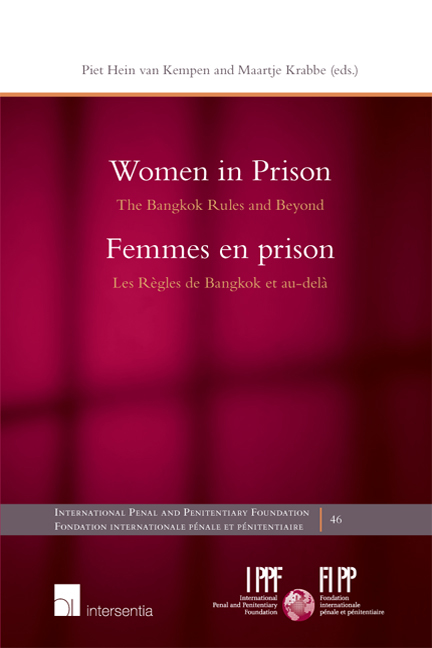Book contents
- Frontmatter
- Foreword
- Avant-propos
- Acknowledgements
- Remerciements
- Contents
- Part I Introductory Synthesis and Analyses: 1ÈRE Partie Synthèse ET Analyses Introductives
- Part II Themes: 2ÈME Partie Thèmes
- Part III National Reports: 3ÈME Partie Rapports Nationaux
- Women in prison in Argentina
- Women in prison in Australia
- Women in prison in Austria
- Women in prison in Brazil
- Women in prison in England and Wales
- Women in prison in Finland
- Femmes en prison en France
- Women in prison in Germany
- Women in prison in Greece
- Women in prison in Ireland
- Femmes en prison en Italie
- Women in prison in the Netherlands
- Women in prison in New Zealand
- Women in prison in Poland
- Women in prison in Portugal
- Women in prison in Russia
- Women in prison in South Africa
- Women in prison in Spain: their criminological and social invisibility
- Femmes en prison en Suisse: la situation des femmes prévenues et condamnées
- Women in prison in Taiwan
- Women in prison in Thailand: implementation of the UN Bangkok Rules in the Thai criminal justice system
- Femmes en prison en Turquie
- Women in prison in the USA
- Appendix The Bangkok Rules: Annexe Règles De Bangkok
- The International Penal and Penitentiary Foundation: History and Purpose
Women in prison in Russia
from Part III - National Reports: 3ÈME Partie Rapports Nationaux
Published online by Cambridge University Press: 25 September 2018
- Frontmatter
- Foreword
- Avant-propos
- Acknowledgements
- Remerciements
- Contents
- Part I Introductory Synthesis and Analyses: 1ÈRE Partie Synthèse ET Analyses Introductives
- Part II Themes: 2ÈME Partie Thèmes
- Part III National Reports: 3ÈME Partie Rapports Nationaux
- Women in prison in Argentina
- Women in prison in Australia
- Women in prison in Austria
- Women in prison in Brazil
- Women in prison in England and Wales
- Women in prison in Finland
- Femmes en prison en France
- Women in prison in Germany
- Women in prison in Greece
- Women in prison in Ireland
- Femmes en prison en Italie
- Women in prison in the Netherlands
- Women in prison in New Zealand
- Women in prison in Poland
- Women in prison in Portugal
- Women in prison in Russia
- Women in prison in South Africa
- Women in prison in Spain: their criminological and social invisibility
- Femmes en prison en Suisse: la situation des femmes prévenues et condamnées
- Women in prison in Taiwan
- Women in prison in Thailand: implementation of the UN Bangkok Rules in the Thai criminal justice system
- Femmes en prison en Turquie
- Women in prison in the USA
- Appendix The Bangkok Rules: Annexe Règles De Bangkok
- The International Penal and Penitentiary Foundation: History and Purpose
Summary
Women's penal colonies are zones of absolute lawlessness.
Irek MurtazinINTRODUCTION
Social control of criminality is a major problem in the contemporary world. Street crime, organized crime, violent crime, terrorism and so forth affect people and give rise to “moral panics” and “fear of crime”. Legislators, politicians, police and criminal justice officials try (often habitually) repressive methods to gain control over criminality. However, traditional measures have not obtained the desired results.
Social control is a mechanism for the self-organization and self-preservation of society through the establishment and maintenance of a normative order, involving the elimination, neutralization or minimization of deviant behavior, including crime. Social control of criminality includes general methods of social control - punishment and crime prevention.
Some have argued that a “crisis of punishment” exists, a crisis of criminal justice, of criminal law's control of criminality, including control of the police. The basic trends in the current western theory (and practice, in some countries) of social control over criminality include recognition of the irrationality and inefficiency of punishment as revenge, a change in social control strategy from “war” to “peacemaking”, a search for non-repressive alternative measures of social reaction and a prioritizing of crime prevention.
Criminal justice, police and penitentiary systems are the result of the general social, economic, cultural and political condition. The contemporary Russian post-Soviet criminal justice system, police and penitentiary systems have a complicated history. They have two main sources: first, the old tsarist system, which was part of the so-called Continental legal system but which had a genuine policy of repression; secondly, the Soviet “socialist” system. It is clear the communist regime was quite terrible. As a result of the unique experiment to establish a social utopia (the slogan on the gate of the Solovki Gulag camp read, “Happiness for everyone through violence”), the country was thrown off the path of civilization.
Gorbachev's perestroika (“reconstruction”) was a necessary attempt to save the State through reform. Khrushchev had made a similar attempt (the so-called Thaw), but Gorbachev's reforms were the most radical. However, these reforms did not bring about their desired end, something that may not have been Gorbachev's fault but certainly was his misfortune.
The contemporary Russian penal system is “better” than the Soviet Gulag but it is still repressive, an offense to human dignity, and especially agonizing for women and adolescents.
- Type
- Chapter
- Information
- Women in PrisonThe Bangkok Rules and Beyond, pp. 645 - 662Publisher: IntersentiaPrint publication year: 2017



